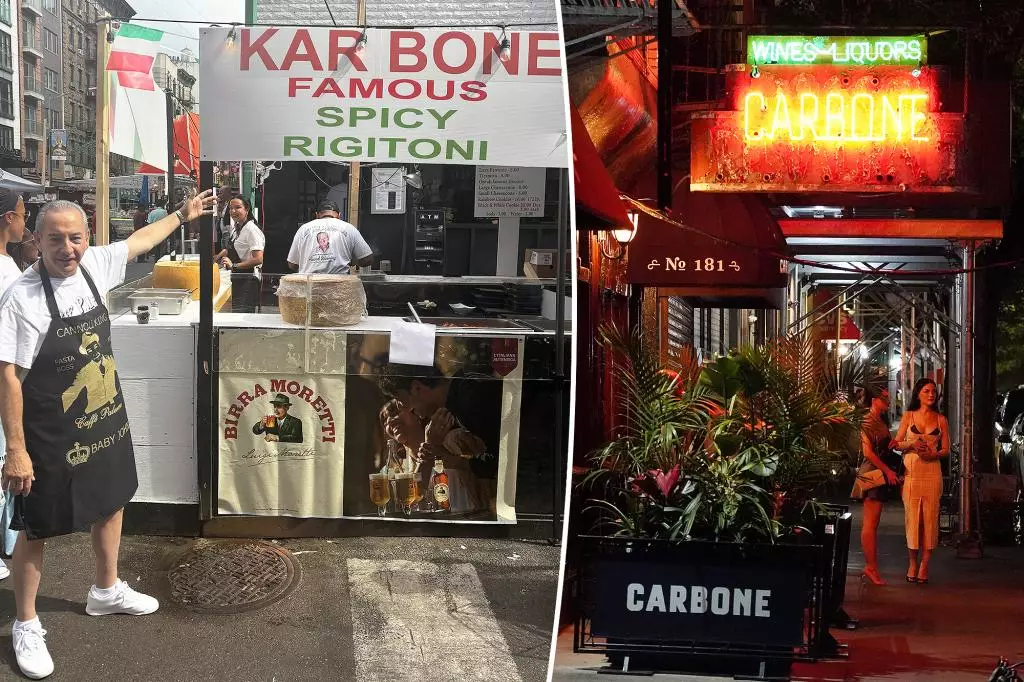In the heart of New York City’s Little Italy, the annual Feast of San Gennaro is a vibrant celebration of Italian culture, food, and community. This cherished festival, which stretches back almost a century, attracts thousands of visitors each year. Yet, amidst the colorful stands and tantalizing smells, an unusual marketing tactic has emerged, highlighting the cultural and culinary landscape of this storied neighborhood. John “Baby John” DeLutro, affectionately known as the “Cannoli King,” has perhaps crossed the line to capture the attention of patrons by mimicking a well-known competitor’s dish from the trendy Carbone restaurant.
DeLutro’s approach is bold and capitalizes on Carbone’s international fame. By branding his dish as “KAR BONE FAMOUS SPICY RIGITONI,” he ostensibly aims to attract curious tourists drawn to the allure of high-end cuisine, recognizing that they may also pass through Little Italy. This blatant homage—or perhaps imitation—raises the question of ethical marketing strategies in the restaurant industry. While DeLutro insists that he only seeks to inject a little humor and creativity into his offerings, the blurred lines between inspiration and appropriation are worth noting. Can homage be a form of flattery, or does it ultimately dilute the original source’s value?
Culinary Creativity or Derivative Dish?
DeLutro’s self-proclaimed title as one of the best pasta makers in the area suggests a level of confidence in his craft. However, his remarks on spicing up his offerings through a play on words seem to deflect from the potential implications of his marketing. While he celebrates his own culinary prowess, one could argue that he’s simultaneously undermining the reputation of a fine establishment known for its carefully curated dishes. Moreover, the misspelling of “rigatoni” raises concerns regarding authenticity—a critical component in both food and branding.
Legal Ground: A Flimsy Justification?
Legalities aside, DeLutro seems to believe he operates within safe territory. He cites the allowance of similar wordplay in marketing as a justification for his own tactics, claiming that competitors have used playful spellings without retribution. However, relying on ambiguous legal precedents to justify his approach could be a risky move. Furthermore, the original chef’s reaction to such mockery—or lack thereof—might determine the fate of such fads in the culinary world.
The Feast of San Gennaro is a time-honored tradition, deeply rooted in community spirit and familial ties. While healthy competition is a norm in the culinary scene, the emergence of tactics such as DeLutro’s could spur discussions on ethics in business practices. After all, restaurants are not just about food; they are about cultural stories and personal legacies. As DeLutro aims for a slice of the limelight, he must be wary of overshadowing the very essence of what makes Little Italy a beloved destination: its rich culinary traditions that deserve respect, not parody.
While the quest for attention and business is a dilemma for many restaurateurs, John “Baby John” DeLutro’s approach raises important questions about authenticity, creativity, and respect within the culinary community. Will his gamble pay off, or will it leave a sour taste in the mouth of patrons longing for genuine Italian fare? Only time will tell.

Leave a Reply